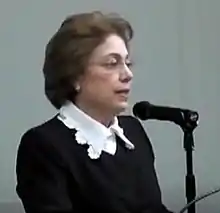Azizah Y. al-Hibri
Azizah Y. al-Hibri (Arabic: عزيزة يحيى الهبري; born 1943) is an American philosopher and legal scholar who specializes in Islam and law.
Azizah Y. al-Hibri | |
|---|---|
 | |
| Born | 1943 (age 79–80) |
| Education | B.A., philosophy, American University of Beirut, 1966 Ph.D., philosophy, University of Pennsylvania, 1975 J.D., University of Pennsylvania Law School, 1985[1] |
| Occupation(s) | Philosopher, legal scholar |
Biography
Al-Hibri is professor emerita at the T. C. Williams School of Law, University of Richmond. She is a former professor of philosophy, founding editor of Hypatia: A Journal of Feminist Philosophy, and founder and president of KARAMAH: Muslim Women Lawyers for Human Rights. A Fulbright scholar, she has written extensively about Islam and democracy, Muslim women's rights, and human rights in Islam. She was an adviser to the PBS documentary Muhammad: Legacy of a Prophet (2002), produced by Unity Productions Foundation.
Al-Hibri is a member of the advisory board of various organizations, including the Pew Forum on Religion in Public Life, the Pluralism Project Harvard University, and Religion & Ethics Newsweekly (PBS). She is also a member of the Constitution Project's Liberty and Security Committee. In June 2011, al-Hibri was appointed by President Barack Obama to serve as a commissioner on the U.S. Commission on International Religious Freedom.[2]
She also wrote the third chapter of Transforming the Faiths of our Fathers: Women who Changed American Religion (2004), edited by Ann Braude.[3]
Al-Hibri is the grandchild of Sheik Toufik El Hibri who established the first Scout movement in the Arab world.
Sources
- "Shattering the Stereotypes: Muslim Women Speak Out" (2005)
References
- "Azizah Y. al-Hibri", University of Richmond.
- "President Obama Appoints Professor al-Hibri to U.S. Commission on International Religious Freedom", USCIRF, June 8, 2011. Retrieved on January 16, 2015.
- "Table of Contents: Transforming the faiths of our fathers". Catalog.lib.uchicago.edu. Retrieved 2015-04-14.
External links
- Homepage of Azizah Y. al-Hibri
- KARAMAH: Muslim Women Lawyers for Human Rights
- Op-Ed: Obama's Bridge to Islam